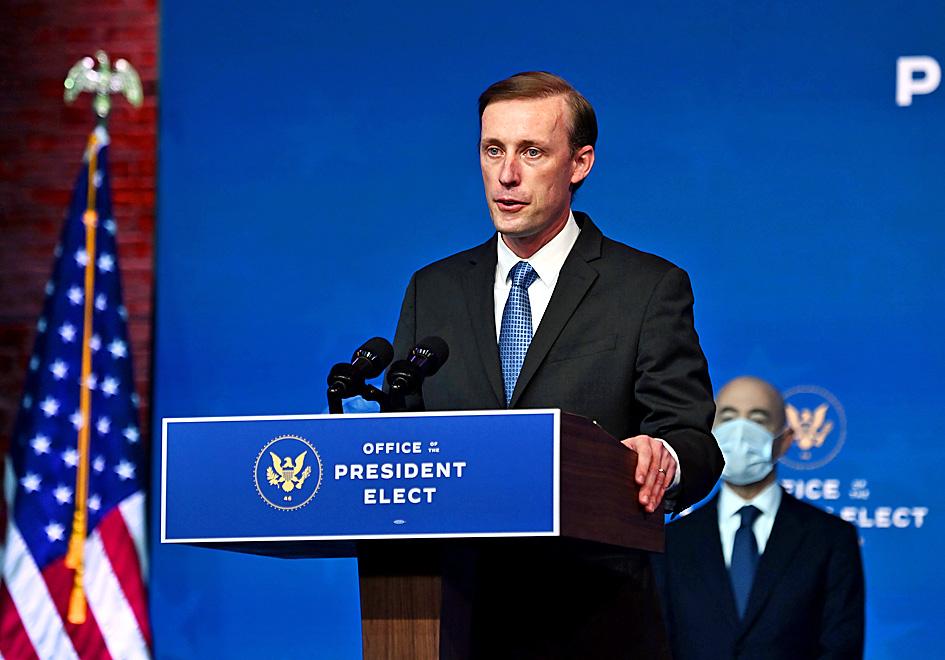The US must be prepared to “impose costs” on China for its bellicosity and threats toward Taiwan, as well its actions in Hong Kong and Xinjiang, US National Security Adviser Jake Sullivan said on Friday.
Sullivan made the comments during an online discussion with Robert O’Brien, his predecessor from the administration of former US president Donald Trump, on the transition of power and US foreign policy.
The discussion was hosted by the Washington-based United States Institute of Peace.

Photo: AFP
O’Brien named China as the top foreign policy challenge being handed over to US President Joe Biden, citing its increasingly “assertive” approach to Taiwan, Hong Kong, the South China Sea and India.
In response, Sullivan proposed four steps the US can take to contend with the challenges that China poses.
The first step, Sullivan said, is to recognize that Beijing is making the case that the Chinese model is better than the US model, and is pointing to dysfunction and division in the US as evidence of this claim.
To combat this argument, the US must “refurbish the foundations of [its] democracy” by tackling social problems, such as racial and economic inequality, he said.
Second, the US would be most effective in advancing its vision for a free, prosperous and equitable society if it does so “in lockstep with its democratic allies and partners,” Sullivan said.
With its allies in Europe and Asia, the US can lead “a chorus of voices” that collectively represents more than half of the world’s economy, which would give it “leverage” to stand up to Chinese pressure, he said.
Third, the US must increase public investment in emerging technologies, such as artificial intelligence, quantum computing, biotechnology and clean energy, as a great deal of the competition between the US and China would be decided by which country enjoys a technological advantage, he added.
The last step is for the US to speak with clarity and consistency in regards to China and other foreign policy issues, Sullivan said.
Specifically, this includes “being prepared to act as well as to impose costs for what China is doing in Xinjiang, what it’s doing in Hong Kong, and for the bellicosity and threats that it is projecting toward Taiwan,” he said.
Meanwhile, in a conversation on Friday with the Philadelphia-based Foreign Policy Research Institute, Representative to the US Hsiao Bi-khim (蕭美琴) said that Taiwan-US ties were “off to a good start” under the Biden administration.
Asked about the widespread support in Taiwan for Trump, which put the nation at odds with many other democratic countries, Hsiao said that Taiwan’s government “never takes a position on domestic US politics.”

INVESTIGATION: The case is the latest instance of a DPP figure being implicated in an espionage network accused of allegedly leaking information to Chinese intelligence Democratic Progressive Party (DPP) member Ho Jen-chieh (何仁傑) was detained and held incommunicado yesterday on suspicion of spying for China during his tenure as assistant to then-minister of foreign affairs Joseph Wu (吳釗燮). The Taipei District Prosecutors’ Office said Ho was implicated during its investigation into alleged spying activities by former Presidential Office consultant Wu Shang-yu (吳尚雨). Prosecutors said there is reason to believe Ho breached the National Security Act (國家安全法) by leaking classified Ministry of Foreign Affairs information to Chinese intelligence. Following interrogation, prosecutors petitioned the Taipei District Court to detain Ho, citing concerns over potential collusion or tampering of evidence. The

NEGOTIATIONS: Taiwan has good relations with Washington and the outlook for the negotiations looks promising, Minister of Economic Affairs J.W. Kuo said Taiwan’s GDP growth this year is expected to decrease by 0.43 to 1.61 percentage points due to the effects of US tariffs, National Development Council (NDC) Minister Paul Liu (劉鏡清) said at a meeting of the legislature’s Economics Committee in Taipei yesterday, citing a preliminary estimate by a private research institution. Taiwan’s economy would be significantly affected by the 32 percent “reciprocal” tariffs slapped by the US, which took effect yesterday, Liu said, adding that GDP growth could fall below 3 percent and potentially even dip below 2 percent to 1.53 percent this year. The council has commissioned another institution

TRADE: The premier pledged safeguards on ‘Made in Taiwan’ labeling, anti-dumping measures and stricter export controls to strengthen its position in trade talks Products labeled “made in Taiwan” must be genuinely made in Taiwan, Premier Cho Jung-tai (卓榮泰) said yesterday, vowing to enforce strict safeguards against “origin laundering” and initiate anti-dumping investigations to prevent China dumping its products in Taiwan. Cho made the remarks in a discussion session with representatives from industries in Kaohsiung. In response to the US government’s recent announcement of “reciprocal” tariffs on its trading partners, President William Lai (賴清德) and Cho last week began a series of consultations with industry leaders nationwide to gather feedback and address concerns. Taiwanese and US officials held a videoconference on Friday evening to discuss the

NEGOTIATIONS: The US response to the countermeasures and plans Taiwan presented has been positive, including boosting procurement and investment, the president said Taiwan is included in the first group for trade negotiations with the US, President William Lai (賴清德) said yesterday, as he seeks to shield Taiwanese exporters from a 32 percent tariff. In Washington, US Trade Representative Jamieson Greer said in an interview on Fox News on Thursday that he would speak to his Taiwanese and Israeli counterparts yesterday about tariffs after holding a long discussion with the Vietnamese earlier. US President Donald Trump on Wednesday postponed punishing levies on multiple trade partners, including Taiwan, for three months after trillions of US dollars were wiped off global markets. He has maintained a 10 percent